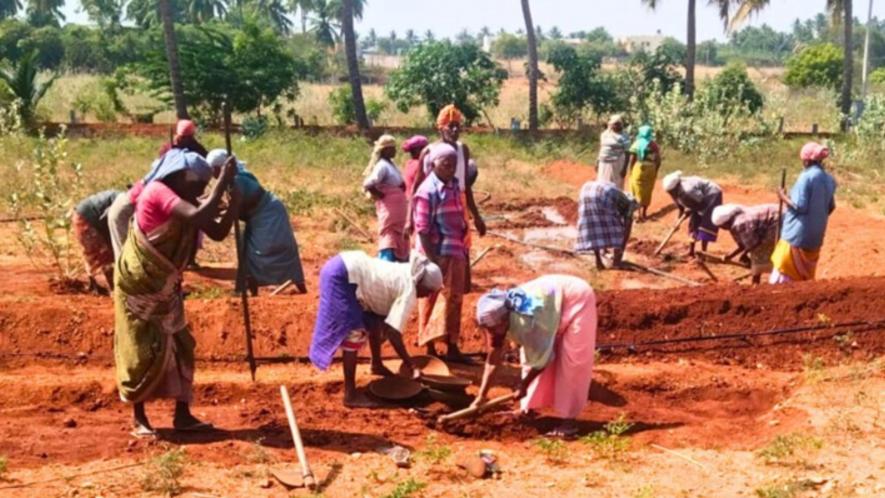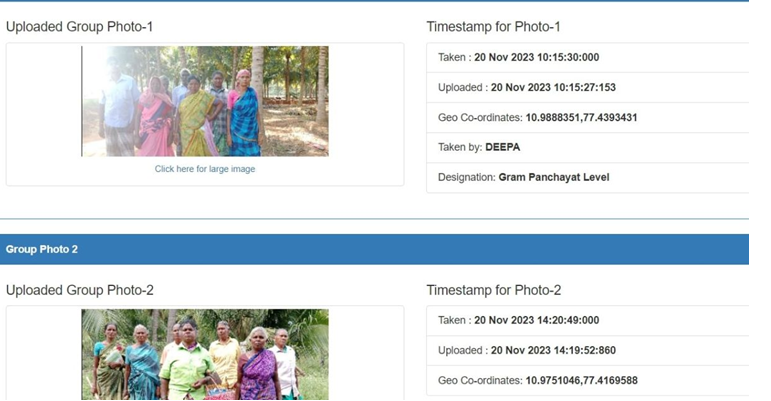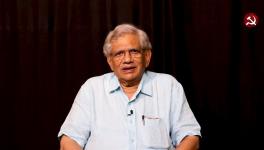Crorepati Fake MGNREGA Beneficiaries in 2 Tamil Nadu Districts Swindle Money

MGNREGA workers at Perumanallur village, in Tamil Nadu’s Tiruppur district. Source: Vignesh A, 101Reporters.
Coimbatore/Tiruppur: R Narayanasamy (43), a businessman from Chinniyampalayam village panchayat, in Tamil Nadu’s Coimbatore district, is a partner in a gold finance company. He stays in a two-storey house and received Rs 11 crore compensation for giving up his agricultural land for Coimbatore Airport’s expansion.
Nevertheless, he received Rs 4,864 and Rs 14,196 in his bank account as wages under the Mahatma Gandhi National Rural Employment Guarantee Act (MGNREGA) scheme in FY21 and FY22, respectively. Similarly, his wife N Bakkiyam (48) received Rs 17,152 between January 2021 and March 2023.
Another crorepati resident and textile mill owner, S Rangasamy (43), received a total of Rs 23,000 in FY21 and FY22.
These so-called MGNREGA workers are among the 18 ineligible beneficiaries identified by the MGNREGA ombudsperson of Coimbatore district, B Navaneethakrishnan, during his field inquiry this October.
“I have received complaints against hundreds of ineligible beneficiaries, but I have huge limitationsbeing the only staff in my office. So I inquire only very serious allegations,” Navaneethakrishnan tells 101Reporters.
He has recommended to district collector Kranthi Kumar Pati that money be recovered from ineligible beneficiaries and legal actioninitiated against panchayat president Rajalakshmi Devarajan and erring authorities in the Rural Development and Panchayat Raj Department.
Navaneethakrishnan informs that he has recommended withholding MGNREGA funds for the village until the money is recovered.
“There are 63 such ineligible job card holders in my village panchayat. The ombudsperson could establish the identity of only 18,” complainant M Selvaraj (70) tells 101Reporters.
Selvaraj, who used information in the MGNREGA website to unearth corruption, claims that he has sent the details of the remaining 45 people to the authorities and is awaiting action.
The situation is no better in neighbouring Tiruppur district. Among the many shocking irregularities at Erasinampalayam village panchayat, in Mulanur block, is the swindling of wages by creation of fake job codes.
According to the inquiry report submitted to Tiruppur collector T Christuraj by ombudsperson M Premalatha, the panchayat has paid Rs 37,185 in wages for the work done on agricultural land owned by P Muthusamy, son of Palanisamy, at Naranavalasu. However, no such individual exists, which means no work was done. The land documents of a namesake from Erasinampalayam village was used to swindle money.
Premalatha has recommended to the collector to instruct the Mulanur block development officer (village panchayats) to recover the money from jobcardholders who were credited wages for the work not done under MGNREGA.
Modus operandi
Reports of ombudspersons accessed by 101Reporters reveal that the modus operandi of swindling money includes creating fake job codes without doing work under MGNREGA—creating assets like roads, compound walls and public utilities using machines, but documenting them as works done by MGNREGA workers.
Wages are credited only to select beneficiaries who are in connivance with corrupt officials, mostly the panchayat president and/or secretary. A panchayat has many worker clusters with about 50 members each. There will be a cluster supervisor among the workers.
“Some of the ineligible beneficiaries claimed the money was credited by mistake and they returned it to the panchayat. How is it possible if they had not shared their account numbers? Coincidentally, all of them live in the same neighbourhood of my panchayat president, whose husband was also the president in the previous two terms,” says Selvaraj.
When 101Reporters contacted Rajalakshmi, her husband N Devarajan asserted, “You can consider me as the president’s personal assistant. The media reports about the scam are fake. They are paid reports.” He confirmed that the MGNREGA funds to the panchayat has not been withheld yet but refused to comment about the ombudsperson's report.
According to the data of Chinniyampalayam village panchayat, ineligible beneficiaries mostly worked on construction/asset creation jobs, not under regular MGNREGA works like conserving water bodies and drought proofing.
“When the panchayat secretary creates a job card, the panchayat president has the responsibility to verify the jobseeker’s financial status. Same diligence has to be followed in verifying land documents while providing administrative sanction for the works on an individual’s lands. But sometimes these are wilfully overlooked even at the level of BDOs,” says Premalatha.
Though uploading of e-muster rolls (attendance register) on the National Mobile Monitoring System (NMMS) was implemented earlier this year to prevent fake attendance, the scenario is different on the ground.

Group photos uploaded on the NMMS portal makes it difficult to identify individuals.
“Instances of fake attendance came down at first, but cluster supervisors started to use a loophole on the NMMS app. As only the group photo needs to be uploaded, they gave attendance to even those who did not feature in the photograph [i.e. those who do not work],” says R Kalaivani, ombudsperson of Thanjavur district.
Kalaivani holds the distinction of being the only ombudsperson in Tamil Nadu who was once a worker under MGNREGA. She had been a cluster supervisor before she was appointed to her current position.
Ombudspersons invisible
Thirty-seven of the total 38 districts in Tamil Nadu, except Chennai, have MGNREGA ombudspersons. However, not many know about them. Last year, appointments were advertised in newspapers. But their effectiveness reflects in the poor number of complaints they receive.
“Ombudspersons keep insisting the authorities to display their contact details at every village panchayat office. But the officials do not wish to do that as it can turn against them,” says Premalatha, who has completed 55 inquiries since she took over a year-and-a-half ago.
Tiruppur district has 265 village panchayats across 13 blocks. There was not even a single complaint from over 90% village panchayats. Not because there is no grievance, but nobody knows there is a mechanism to complain.
A February 8 letter from Amit Kataria, joint secretaryMGNREGA, ministry of rural development, to state governments mentions that all necessary support to carry out the assigned functions of ombudspersons, including support staff, office equipment, complaint box, telephone helpline, shall be provided by the district authority specified by the state government.
Contrarily, the ombudspersons in Tamil Nadu are working alone even without stenographers. “I have written to the district administration to provide me with separate staff, but nothing happened. An ombudsperson is equivalent to a district revenue officer (DRO). Will they give such a chair and table to the DRO?” asks Navaneethakrishnan.
In the hierarchy of district administration in Tamil Nadu, the DRO is next only to the collector and fills in during his/her absence. However, since MGNREGA ombudspersons are not full-time government employees, they receive minimal support from the officials, especially at district rural development agencies (DRDAs).
R Sumathi, assistant project officer (wages and employment) at Tiruppur DRDA, tells 101Reporters that ombudspersons voluntarily visit the field to receive complaints so that they will get a sitting charge (apparently, ombudspersons are not entitled to salaries).
Vehemently denying this, Navaneethakrishnan and Premalatha say the allegation defies logic. “If we are voluntarily getting complaints for non-issues, how are we receiving such an abysmally low number of complaints?” asks Premalatha.
Navaneethakrishnan also laments that officials at panchayat union offices sit on files for months together whenever ombudspersons seek an information or action taken report from them.
Ineffective, corrupt social audits
Until a few months ago, there were social audit wings at DRDAs across the state. However, they were disbanded after numerous allegations, including seeking bribes in return for not escalating corruption, surfaced. The state government is now on the move to hire new members.
Headed by a district resource person employed on contract, the wing had a block resource person in every block. It trained about 10-20 members of the general public in every block and took them along while auditing.
“There were many instances where the wing members informed the panchayat presidents in advance about what they will audit during their visit,” says Karuna Muthiah, an independent researcher on rights-based campaigns. He was earlier a part of the Villupuram district social audit wing.
“What has happened in Tiruppur and Coimbatore has been happening across the state. Initially, MGNREGA wages were handed over in cash. So, if a job cardholder’s name is misused, he or she might never know about it. But since money is credited to bank accounts nowadays, it is very obvious that ineligible beneficiaries are colluding with the erring authorities,” he says.
“Even if a financial irregularity is unearthed, the high-level committee instituted to act upon it is highly skewed. Of the five members, four, including the collector and DRDA officials, are government employees. The district resource person had severe limitations in taking action even if corruption was established through inquiry,” says Muthiah.
He also questions the very composition of the wing at the statelevel. “The director, joint director and assistant directors were all past DRDA officials. They may downplay many irregularities as administrative difficulties.”
Corruption in MGNREGA begins when the panchayat issues job cards to ineligible beneficiaries. Fake attendance is given by some cluster supervisors, appointed only because they are in connivance with the panchayat president or secretary.
“Not just MGNREGA, reports of social audits, ongoing projects and income and expenses of the panchayat are also submitted at gram sabha meetings. People should attend them and question irregularities if any.The best way to end corruption in MGNREGA is public verification of data on the website. The supervising officers are outsiders, but locals know whether a work is really going on and can identify ineligible beneficiaries, fake attendance, etc.,” says Premalatha.
Get the latest reports & analysis with people's perspective on Protests, movements & deep analytical videos, discussions of the current affairs in your Telegram app. Subscribe to NewsClick's Telegram channel & get Real-Time updates on stories, as they get published on our website.
























